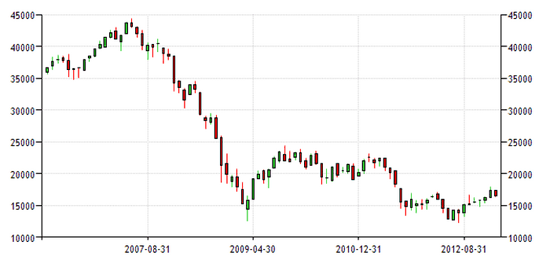Borsa Italiana in History The Italian Stock Exchange had its beginning as the Milan Merchandise Exchange. Viceroy Eugène Napoléon decreed the establishment of the exchange in 1808 and it first started with a commission of 15 men, which consisted of merchandise brokers, traders, and bankers. The 1970’s saw the prominence of Milan as the center of the network of Italian stock exchanges. Financial institutions, headed foremost by banks, began to earnestly equip themselves with centralized order management technology that allowed them to direct most of their transactions to Milan, effectively making the location a center of many economic activities. Privatization process of the Borsa Italiana started in 1992 when private state holdings, such as INI, ENI, and major national banks shares were sold in the stock market to correct deficits. The process culminated in 1997 when the exchange became officially a part of the London Stock Exchange Group. Italian Stock Exchange Booms and Busts The Borsa Italiana has its fair share of booms and busts in its history. For example, the years between the First World War and the Second World War have seen the Italian stock market underwent a vicious cycle of booms and busts. It plummeted drastically at one point and euphorically soared the next moment. Italian Stock Market in Recent Years More recently, the years between 1997 and 2013 has seen the Italian stock market enjoy an average of 29679 index points; with an all-time high of 50109 points in 2000 and all-time low of 12363 index points in July of 2012, which was largely due to the euro-zone crisis. During the last month, the Borsa Italiana had a negative performance with a decline of 5.56% or 973 index points in the last thirty days.  Should You Invest in the Italian Stock Market? While Italy is in a recession, there’s still a strong case for investing in the country. For one, the country does not have a property bubble unlike most Euro countries embroiled in the crisis. Its problems stems mostly from unresponsive economy and its reliance on additional borrowing to repay its existing debts. Moreover, Italy’s household debt has been relatively low at just around 53% of its GDP according to the records of the Bank of International Settlements. This is so low when you compare it to Britain’s 106% of its GDP in 2010. And lastly, the Italian government hasn’t been recklessly wasteful in public spending. In fact, the BBC pointed out that the amount the government takes in taxes is more than the amount it spends on public service. However, at the other side of the coin, Italy’s economy has been very slow for years in terms of growth and productivity. It lost its competitiveness in the labor market due to its high unit labor cost -- problem that could have been easily remedied by inflating the lira, which would have trimmed the Italy’s labor cost in real terms. Should a return to the lira become a possibility in the future, Italy can take advantage of a better currency exchange rate, which would usher Italy back to the capital markets more quickly. However, it’s not an option for as long as Italy stays in the Euro zone. This is why Italy is seeking one other recourse out of this problem – labor market reforms. And because of these economic circumstances, Italy may emerge from this crisis quicker than other countries. Therefore, if you are an investor seeking ways to profit from Europe’s economic situation, Italian stock exchange may be provide good returns for your money. After all, it’s when situation seems bleak when you stand to gain most profits due to the market’s cheap prices. Right now, European markets is the best place for bargain-hunting investors. It is important to note, however, that it is not without inherent dangers and worst-case scenarios; thus, investing in Italy is still a bet that is best reserved for the bold. comments powered by Disqus |

|
|
|
|







